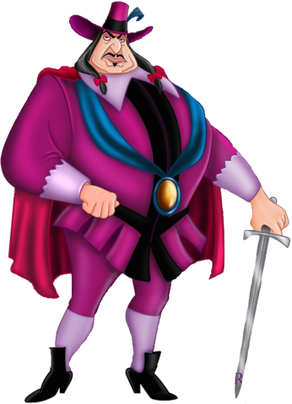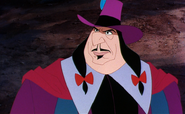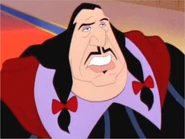m (category merger) |
(Adding categories) |
||
| Line 48: | Line 48: | ||
[[Category:Ugly Characters]] |
[[Category:Ugly Characters]] |
||
[[Category:European]] |
[[Category:European]] |
||
| + | [[Category:Spoiled Brat]] |
||
Revision as of 07:20, 29 September 2020
| This article needs more links. Please improve this article by adding links that are relevant to the context within the existing article. (June 2018) |

Governor Ratcliffe is the main antagonist of Disney's 1995 animated feature film, Pocahontas and its 1998 sequel.
Pocahontas
Ratcliffe leads an expedition to Virginia to find gold and other riches (which he wants to keep for himself). He fails to tell any of the other crew of his real reason of going to Virginia and recites the "adventure of our lives" and "freedom" speech to cover it up. When they see land, Ratcliffe meets with John Smith, whom the crew admire, about his plan on dealing with the "savages" and "filthy little heathens" (what he calls the Native Americans,) and Smith assures his success and the meeting's through. Ratcliffe arrives on the Shore of Virginia shortly after Smith and Thomas, a new recruit, then takes some land in the name of King James and calls it Jamestown.
After Smith leaves to search for the Indians, Ratcliffe orders some men to build a fort and clear the ship while the rest dig for gold. Unfortunately, the men's search turns up nothing, and even more, several Indian warriors spy on the settlers, which Ratcliffe sees. Believing that they are about to launch an ambush, Ratcliffe panicks, and a battle ensues between the settlers and the warriors, during which Thomas nearly shoots Ratcliffe by accident and the governor himself wounds one of the warriors, forcing them to retreat. The men celebrate but Ratcliffe, knowing the Indians will return and in bigger numbers, orders his men to return to camp, bring the rest of the ship's cannons ashore and finish the fort's construction. He then chastises Thomas' ineptitude on the battlefield and warns him to learn how to shoot properly, or he'll never be considered a man.
A few days later, as the men finish the fort, Ratcliffe starts to panick in the fact that after so much digging, he and his men still have not found any gold at all. He struggles to figure out what he's overlooking, when Wiggins, his servant, stumbles into his tent, having apparently been shot through the head with an arrow. Ratcliffe is shocked, but Wiggins happily notes it to be a joke, having made the contraption himself using a broken arrow. Ratcliffe snatches it from him and derides the thing as silly, but then, it gives him an idea about why they haven't found any gold. Ratcliffe asks Wiggins why the Indians attacked them earlier. Wiggins correctly points out that they invaded the Indian's land and began stealing their resources, but Ratcliffe dismisses this, explaining his belief that the Indians are hiding the gold, and begins forming a plan to take it from them. He then goes out to find John Smith, only to find that he has gone off and sends Ben and Lon, two other settlers and friends of Smith's out to find him.
Later that evening, after John Smith returns from supposedly "scouting the terrain", Ratcliffe orders him to prepare the men for battle so they can destroy the Indians and take the gold. But Smith tells Ratcliffe that there is no gold and that they don't have to fight the Native Americans because he already met one of them, and suggests the Natives can help them by showing them their land. Ratcliffe, however, doesn't believe this, declaring that the land belongs to him and announces that "Anyone who so much looks at an Indian without killing him on sight will be tried for treason and hanged!"
Later when he sees John Smith running off somewhere that night, he sends Thomas to follow him, hoping the "poor excuse for a soldier" will be able to prove his worth. He later overhears the men talking about Smith's capture (Smith had been attacked by a warrior named Kocoum, whom Thomas had promptly shot dead during the fight, but had been ordered to flee the scene for Smith to take the blame) and decides to wage war against the Indians to rescue Smith exterminate the "savages" and take their gold for himself (although he merely tells his men it is a rescue mission to ensure their support). After the two sides march their way to one another, they are stopped abruptly by Pocahontas, who tells everyone that they were led onto the path of hatred. All the men on both sides are deeply touched by the woman's love and wisdom, and lower their weapons. The would-be combatants now make it clear that there will be no battle.
Ratcliffe is the only one not moved by this, and orders his men to open fire anyway, thinking it is a trick, but they refuse. Outraged, Ratcliffe grabs a gun from one of his men and prepares to shoot Powhatan himself. John Smith sees this, jumps in the way and takes the bullet (though not fatally). Finally seeing Ratcliffe for the corrupt, greedy monster he really is and realizing that Smith was right all along and they should never have listened to Ratcliffe, Thomas, Ben, Lon, and the other settlers rebel, bounding and gagging the governor and sending him back to England to await punishment for his crimes. All the while, he angrily tells the settlers that they are the real criminals for turning against him and warns that they are the ones who will be punished.
Journey to the New World
Ratcliffe returns in the sequel Pocahontas II: Journey to a New World. Apparently, he has fabricated his own version of the events in Jamestown to implicate John Smith as the traitor, and despite the impossibility of his honesty, he is easily believed by King James (mostly due to their close, personal friendship) and sent to capture Smith for questioning along with some soldiers. In the ensuing fray, Ratcliffe tells Smith "Pity. I so would have preferred to see you hanged", knocks Smith off a building to his apparent death, and tells King James that he had tried to stop Smith from committing suicide; unbeknowst to anyone, this is part of Ratcliffe's plot to go to war against the Powhatan Nation and find the gold he still believes they possess, all while avoiding punishment for his own crimes. When John Rolfe, who had been sent to Jamestown to bring back Powhatan for questioning, returns with Pocahontas, Ratcliffe immediately plots to get rid of her, convincing James to invite Pocahontas to the Hunt Ball, where he has planned a bear baiting with a jester, knowing about her "savage" instincts. Pocahontas, at first, impresses the King with her manners taught by Rolfe, but naturally becomes outraged at the bear baiting, especially when the snobbish aristocrats in attendance do nothing but laugh at the creature's torture, and openly insults Ratcliffe and King James, calling them savages. Ratcliffe convinces King James to imprison her and sentence her to death, and is allowed to take his armada to Jamestown for war with the Powhatans. However, unbeknownst to Ratcliffe, his lies are finally exposed when John Smith, who survived his ordeal with Ratcliffe, aids Rolfe in breaking Pocahontas out of prison and presents himself in the King's court. Realizing that he has been fooled, King James orders Ratcliffe to be stopped.
In the subsequent battle, after the armada is successfully halted, Ratcliffe attempts to end Pocahontas's life until Smith intervenes. The two duel, with Smith ultimately disarming Ratcliffe. However, in a sneak move, Ratcliffe pulls a pistol on Smith and almost kills him for real, but is subdued by Rolfe and thrown overboard. Before he falls into the river, Smith says to Ratcliffe the latter's earlier remark: "Pity. I so would have preferred to see you hanged." Ratcliffe makes it to shore where King James and his soldiers are waiting. He makes a last and feeble attempt to lie to King James, telling the king that the "fugitives are getting away", and of them stopping the armada. However, King James, who has already learned the truth of Ratcliffe's treachery, coldly tells his now-former friend, "No more lies" and and orders his men to arrest him while walking away to his carriage in disgust. Ratcliffe's sentence for high treason is unknown, though realistically, he would have been put in prison for life and/or executed.


